Redditor Seeks To Know If She Was Wrong For "Threatening" Her Neighbor With Her Personal Protection Dog
Everyone has had the experience of living next to a spooky or untrustworthy neighbor at some point. Sometimes, there isn't anything specific you can point to; it could be the neighbor's demeanor, the hours they keep, or the odors that come from them.
Other times, it could be much more serious, such as disturbing noises, rage, or direct threats made against you or your loved ones. Your greatest initial course of action might be to call the homeowners' association (HOA), that is, if you reside in an apartment complex or a neighborhood-governed community.
Another step you can take is to gather any proof you have of the problem and notify the authorities if you have a legitimate, urgent fear of your neighbor, especially if they make violent threats or engage in actual violence or property destruction.
The most effective way to warn your neighbor to avoid you and your family might be for law enforcement to come and knock on their door.
In today’s AITA story, the OP did the latter, but first, let’s get to know all that happened. The 28-year-old OP recently moved to her first house in the suburban neighborhood, and she has a Dutch Shepherd named Oaken, who is trained as a Personal Protection Dog (PPD).
She was running in the neighborhood park with her dog when a man stopped them and started asking creepy questions.
The headline

Some context:
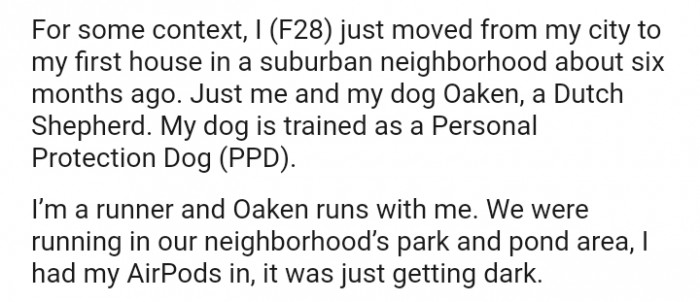
It was annoying and creepy too
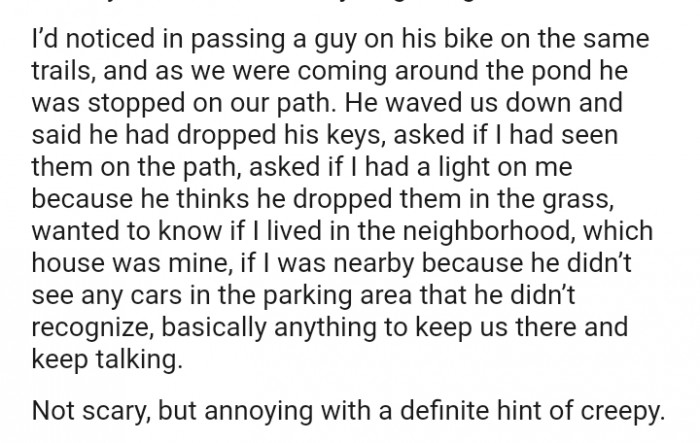
The Role of Fear in Neighborhood Dynamics
This situation sheds light on the psychological dynamics of fear and perceived threats within communities. Dr. Rebecca Johnson, a social psychologist, explains that fear often breeds misunderstanding and can lead to disproportionate reactions. When individuals perceive a threat, their instinct is to protect themselves, which can escalate tensions between neighbors.
Research published in the Journal of Community Psychology indicates that fear can distort perceptions of reality, leading individuals to interpret benign actions as aggressive. This misinterpretation can create a cycle of fear and hostility that undermines community relationships.
Understanding Aggression in Dogs
Research indicates that perceived aggression in dogs often stems from fear or anxiety rather than a desire to harm.
Dr. Karen Overall, a renowned veterinary behaviorist, explains that many dogs react aggressively when they feel threatened, making it essential for owners to understand the underlying triggers.
This understanding can help prevent misunderstandings between neighbors and pet owners.
More to the story:
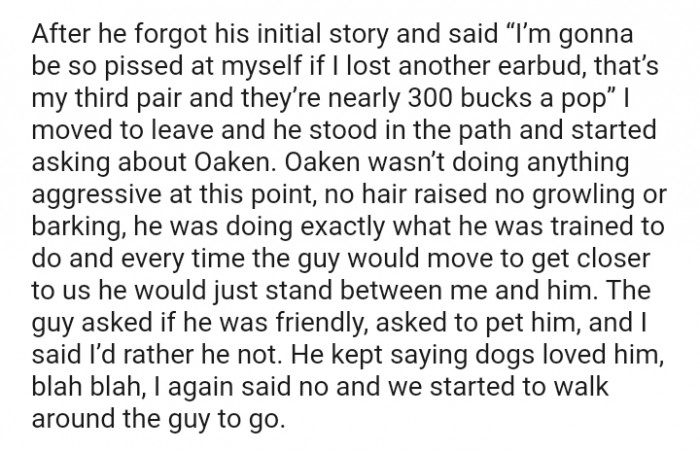
The encounter was strange
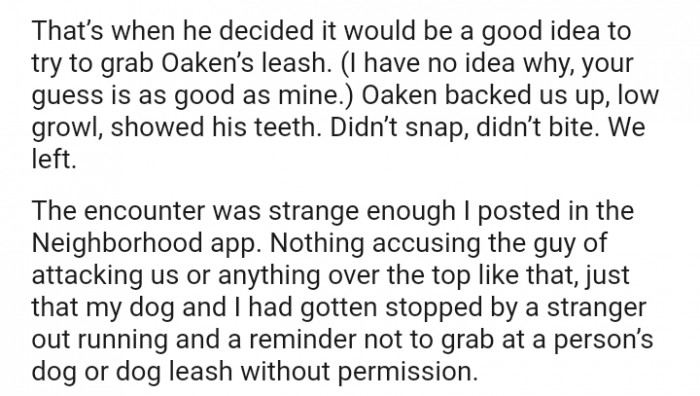
"Aggressive attack dog"
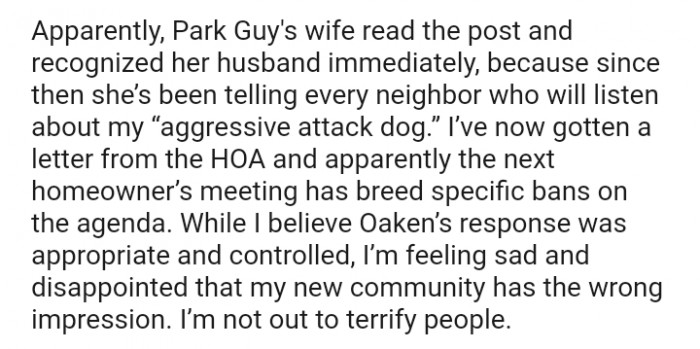
Moreover, the concept of social capital plays a significant role in neighborhood dynamics. Communities with strong social ties tend to exhibit lower levels of fear and anxiety. According to Dr. Robert Putnam's research, social capital fosters trust and cooperation among neighbors, which can mitigate fears related to perceived threats. Building social connections can, therefore, enhance community safety and reduce misunderstandings.
Encouraging open communication between neighbors can help address concerns and dispel fears, creating a more harmonious living environment.
Studies show that communication about a pet's behavior is crucial in mitigating neighborhood conflicts.
According to research published in the Journal of Veterinary Behavior, transparency about a dog's temperament can foster better relationships between neighbors and pet owners, reducing unnecessary fears.
Open communication can help prevent the escalation of conflicts and improve community dynamics.
Was I wrong with my actions?

And the comments poured in their numbers, with the OP replying to virtually all while providing more information about the story.
1. The guy is lucky your dog's well trained
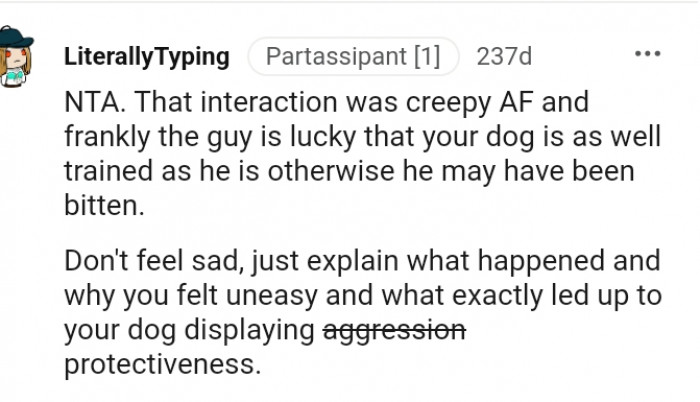
2. The aggressive predator husband
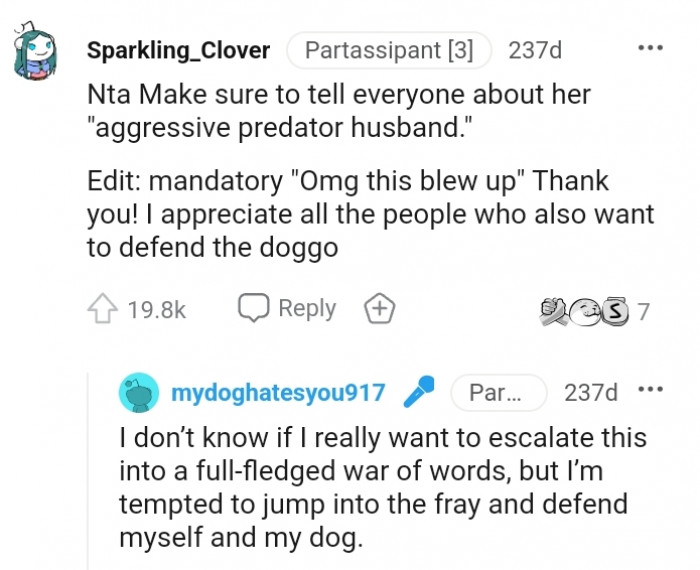
Strategies for Healthy Community Interactions
To alleviate tensions between neighbors, open dialogue is crucial. Community engagement initiatives can facilitate discussions that allow residents to express concerns and clarify misunderstandings. Research shows that neighborhoods that prioritize communication tend to develop stronger bonds and greater trust among residents.
Additionally, organizing neighborhood watch programs or community events can foster positive interactions, helping to shift the focus from fear to collaboration. These proactive measures can enhance community cohesion and create a safer environment for all.
Practical Strategies for Managing Dog Behavior
For dog owners, establishing clear boundaries and training can significantly reduce aggressive behaviors.
Implementing consistent training techniques, such as positive reinforcement and desensitization, can help dogs feel more secure and less likely to react aggressively.
Additionally, providing a structured routine can enhance overall behavior and reduce anxiety in pets.
3. Make a police report about the incident
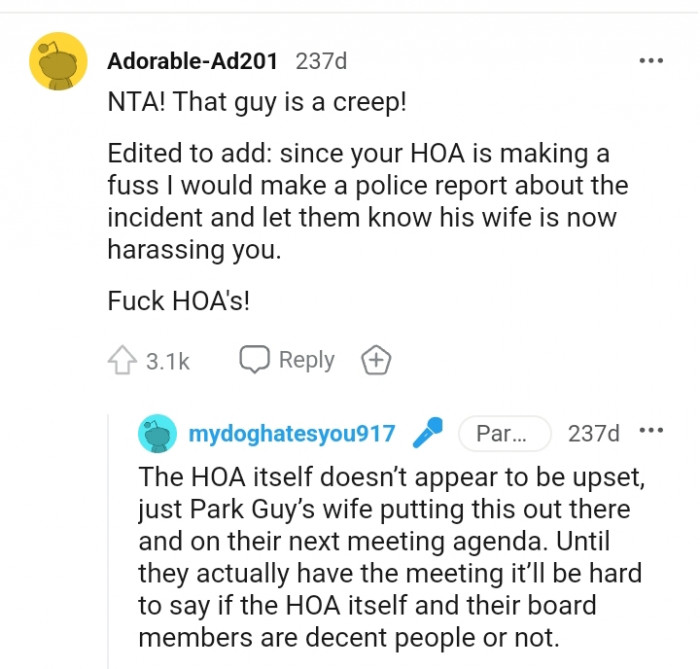
4. She outed her creepy husband
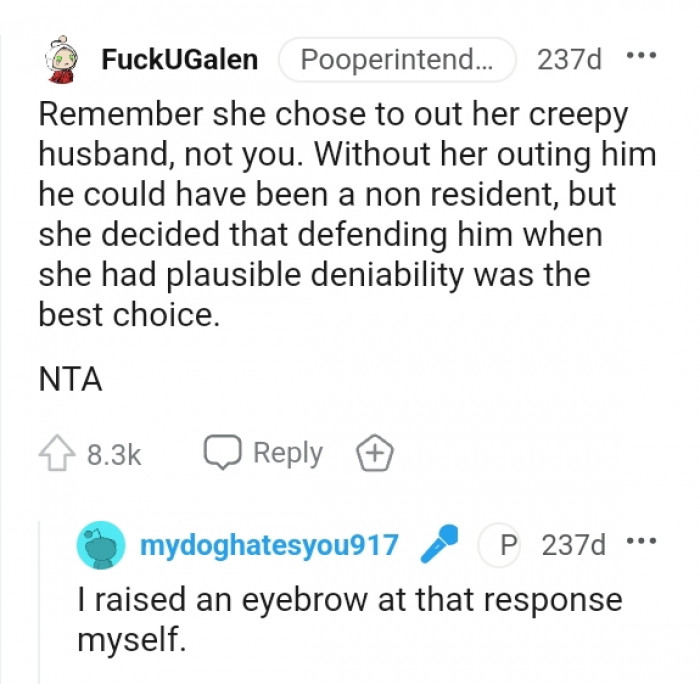
5. You were simply being safe
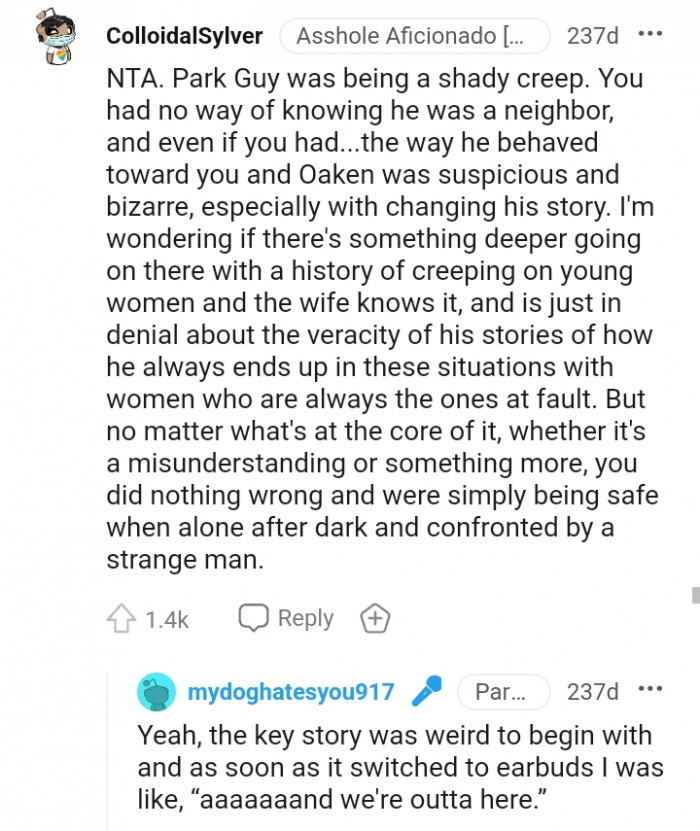
Furthermore, education about proper pet ownership can significantly reduce conflict. Providing resources and workshops on responsible pet care can help pet owners understand their animals' behavior and prevent misunderstandings with neighbors. According to Dr. Daniel Goleman, an emotional intelligence expert, "Understanding our pets' emotional needs can foster better relationships within our communities." By promoting awareness and understanding, communities can work together to address fears and create a supportive atmosphere, as noted by Dr. Angela Duckworth, a character researcher, who states, "Building a culture of empathy and responsibility is essential for harmonious living."
Engaging in community education about responsible pet ownership can also foster understanding and cooperation among neighbors.
Hosting workshops or information sessions can help demystify dog behavior, allowing neighbors to feel more comfortable and informed.
Ultimately, fostering a spirit of cooperation and openness can lead to healthier relationships within the community.
6. From a victim of repeated harassment
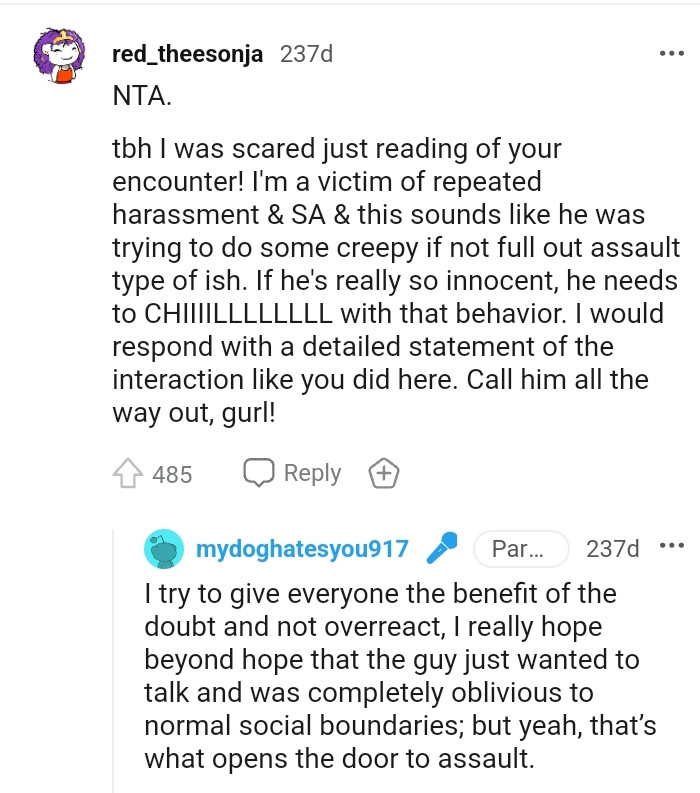
7. I would have been massively uncomfortable
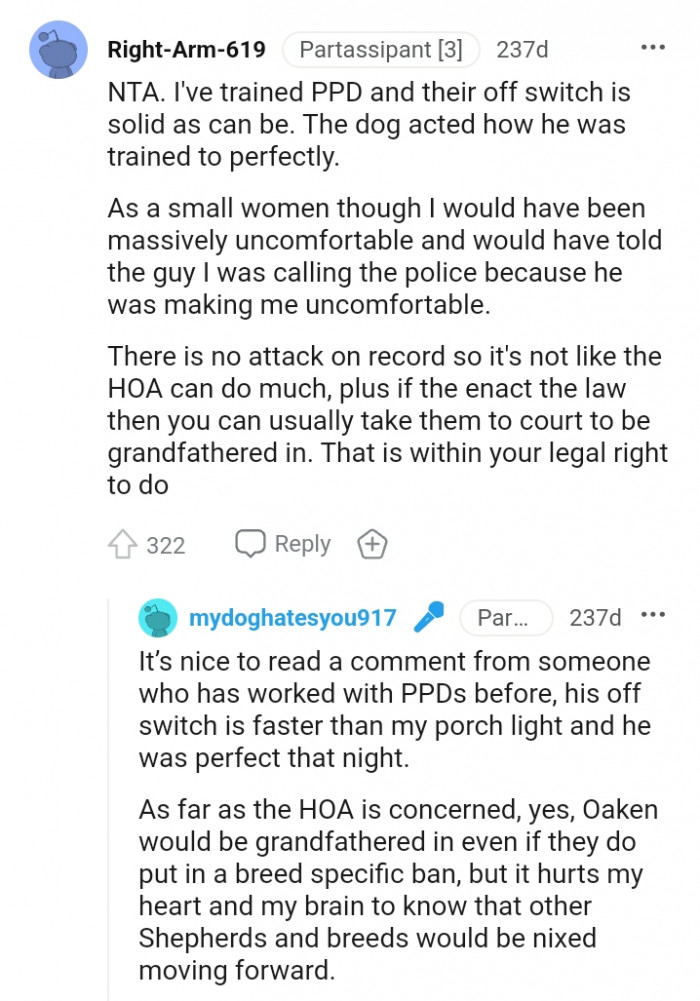
8. Don't get into a war of words
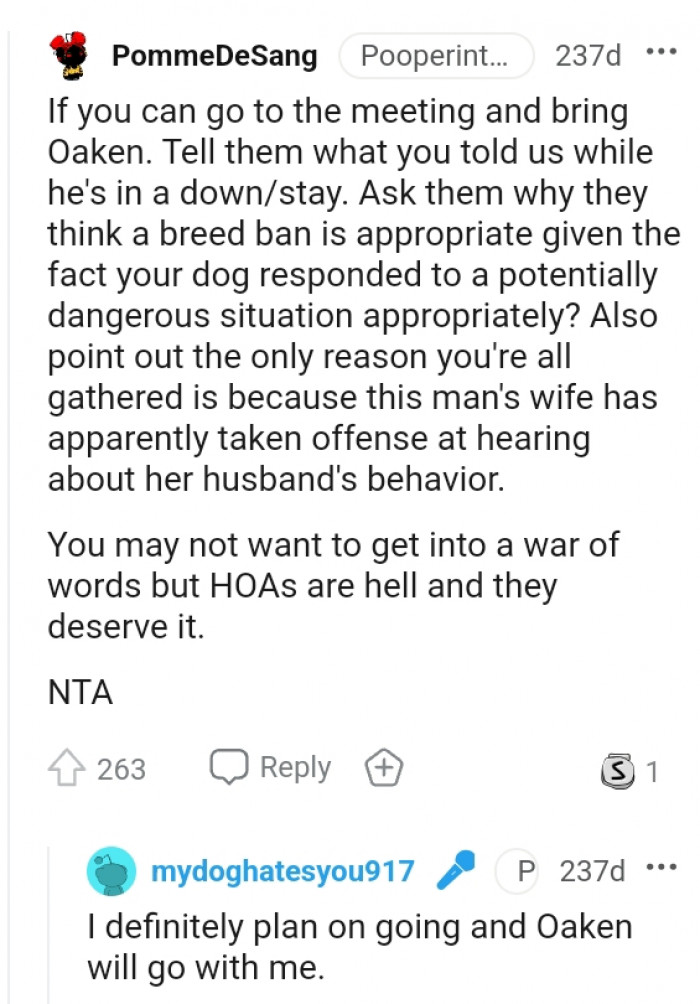
9. She feels bad about her creepy husband

10. Glad you got your good boi with it

Here is the first edit given by the OP as an update to the story
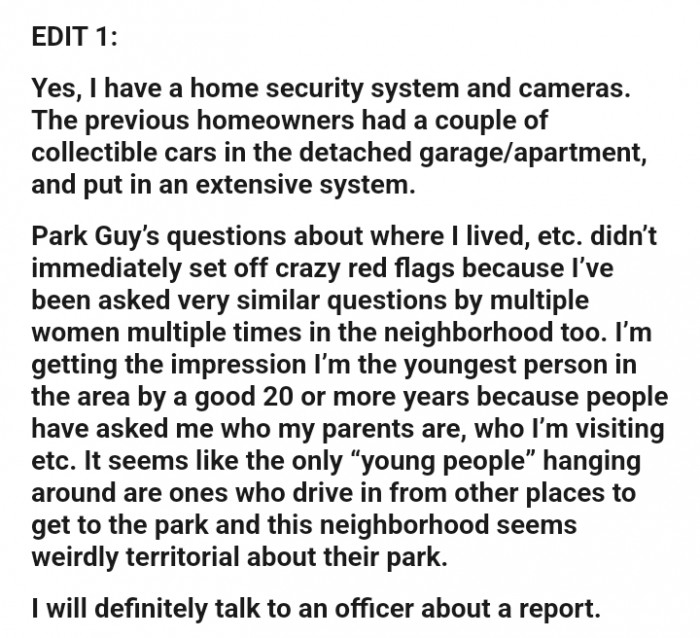
11. Her husband was being a creep

12. Tell them your dog is trained
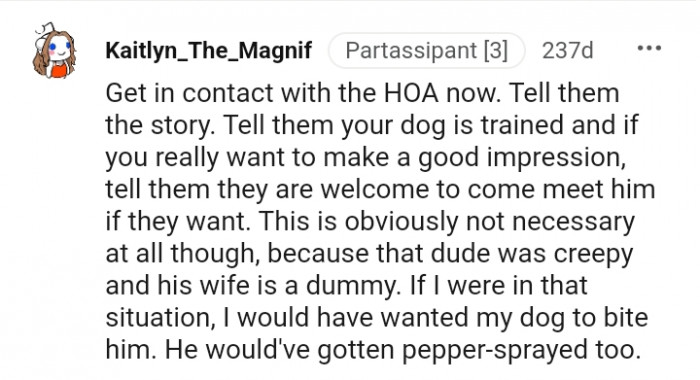
13. The "dog loves me" type
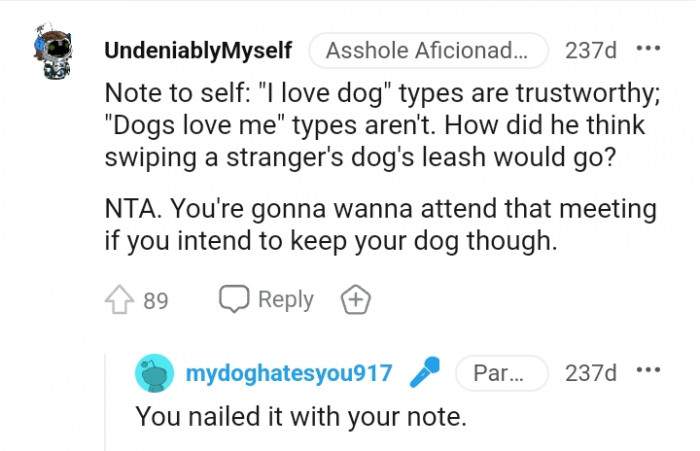
14. I can't imagine anyone being dumb
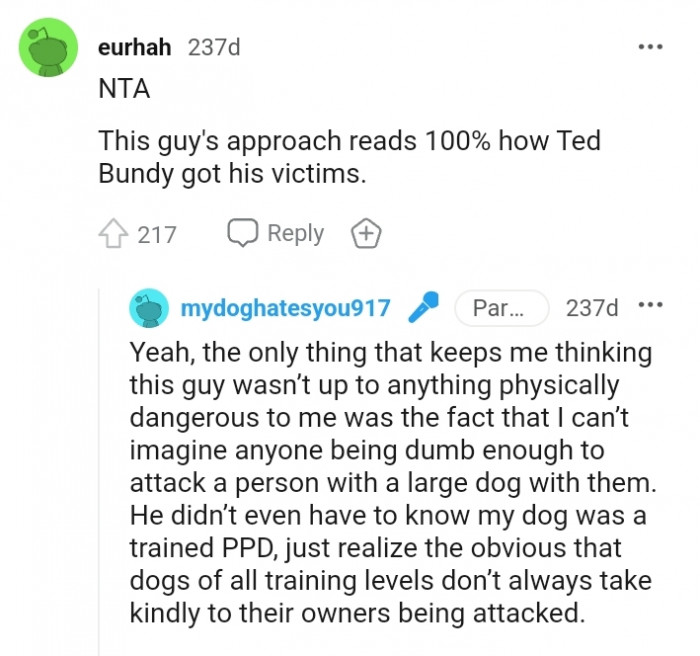
15. Turn it back on them
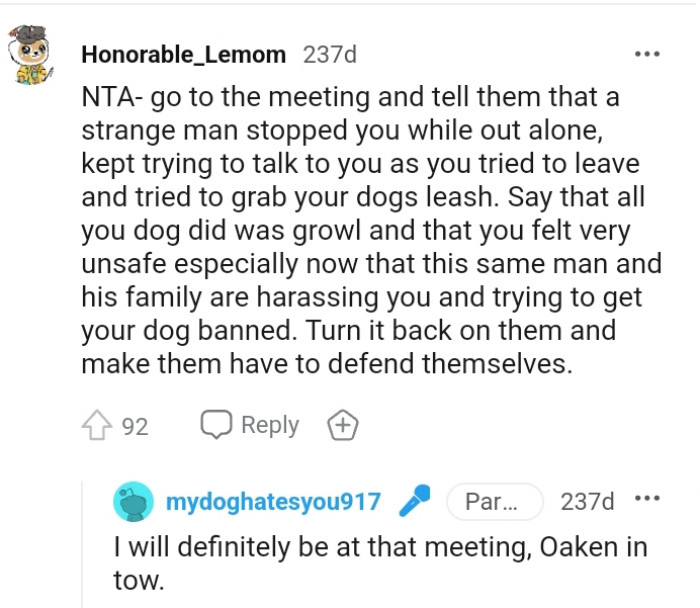
16. They literally tried to kill your dog
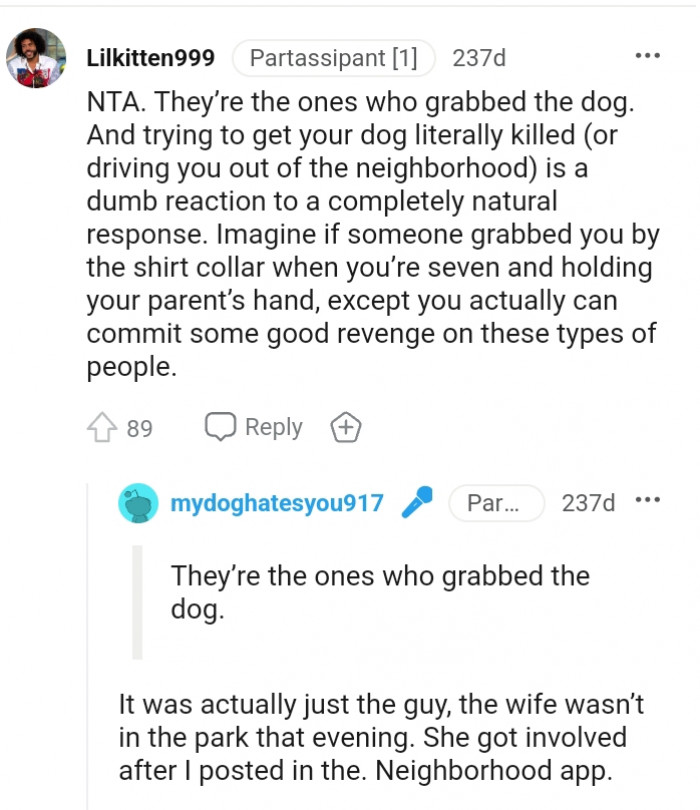
17. These questions seem like information gathering
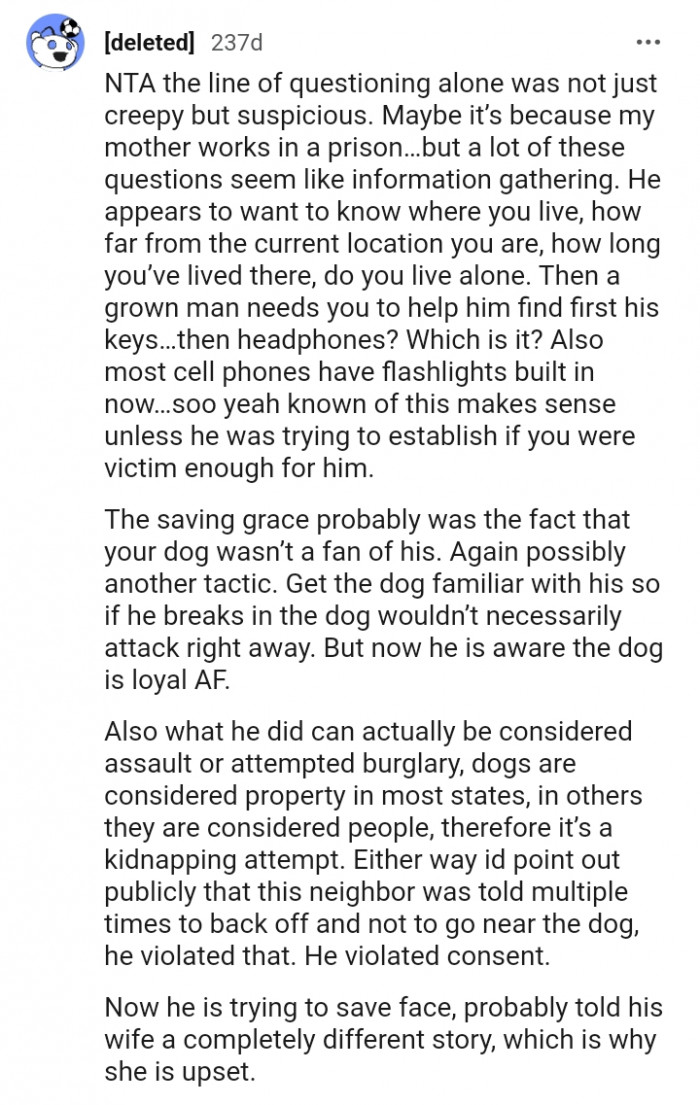
18. Call the police and file a complaint
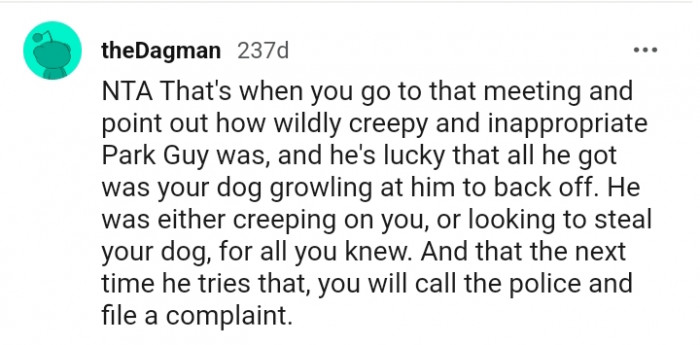
19. His behavior was creepy
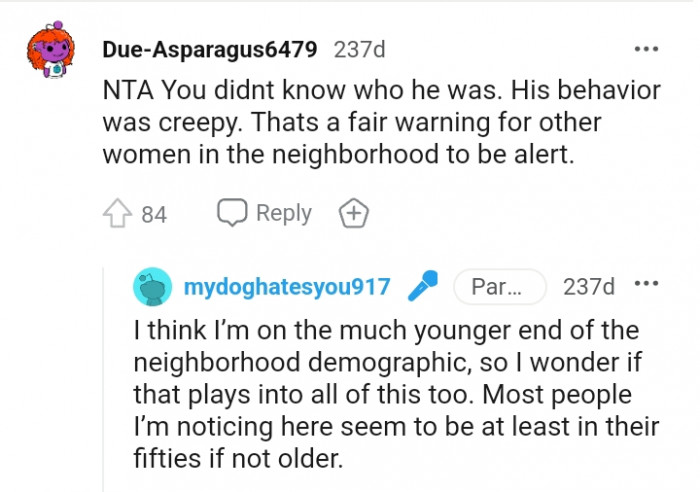
20. The wife outed her own husband

For an additional update to the first, the OP gave another edit and here it is...
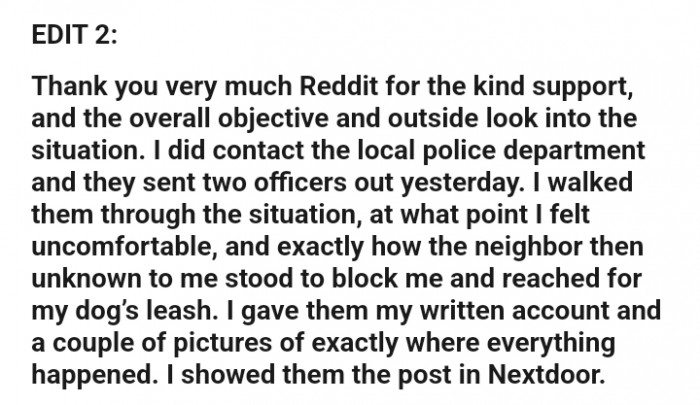
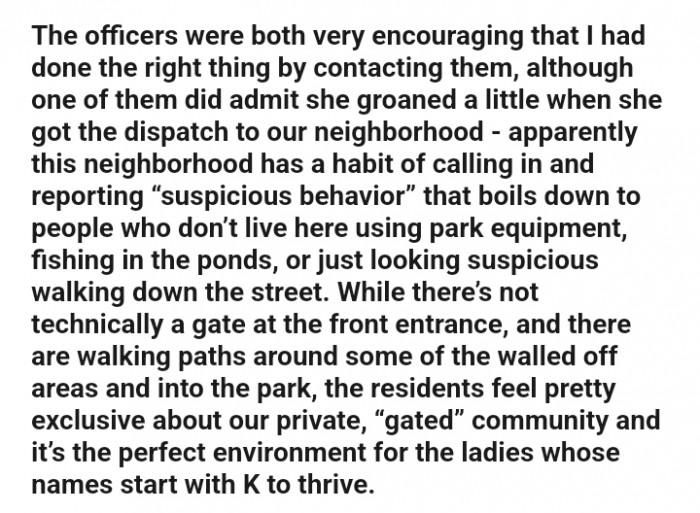
He got a pretty expensive talk
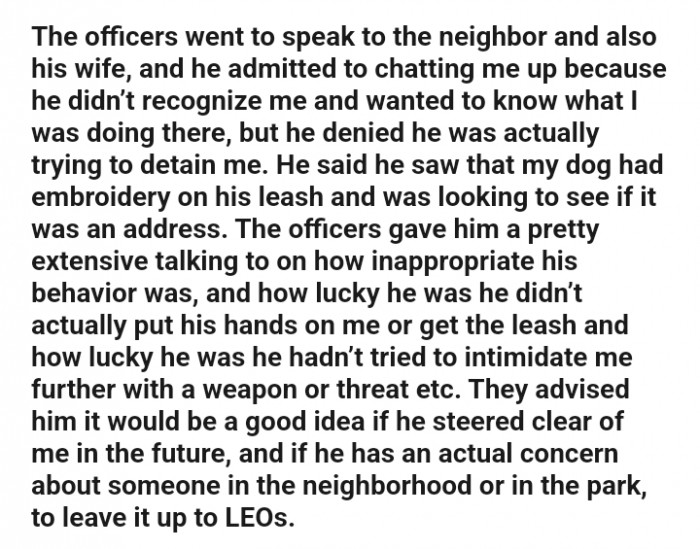
Cops got involved:
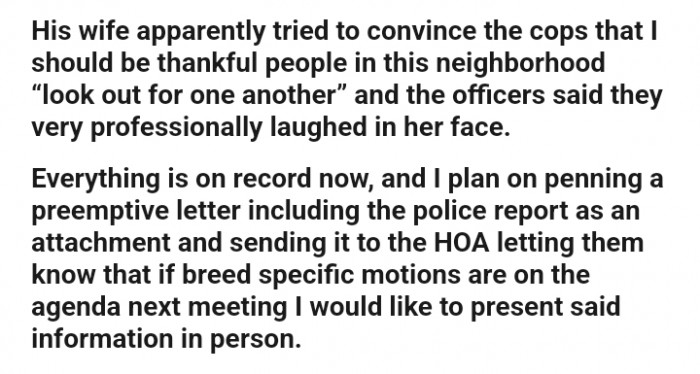
According to Redditors, the neighbor was indeed creepy, and they were of the opinion that the wife outed her own creepy husband. We do hope everything pans out well for the OP, and we’re sure Oaken will protect her.
What are your thoughts about this story? Leave your replies in the comments below.
Psychological Analysis
This situation highlights the complexities of dog behavior and the challenges of miscommunication between neighbors.
It's crucial for owners to engage in responsible pet ownership and to communicate openly about their pets' behaviors to foster understanding and reduce fears.
Analysis generated by AI
Analysis & Alternative Approaches
Navigating the complexities of dog ownership and aggression requires a nuanced understanding of canine behavior and communication.
Research consistently emphasizes the importance of transparency and training to enhance community relationships.
By addressing these factors, dog owners can create a safer and more harmonious environment for everyone involved.
Analysis & Alternative Approaches
This incident highlights the need for empathy and communication in neighborhood dynamics. Mental health professionals advocate for proactive engagement strategies that address fears and foster understanding among community members.
By prioritizing open dialogue and education, neighborhoods can cultivate stronger social ties and create safer, more harmonious living environments.



